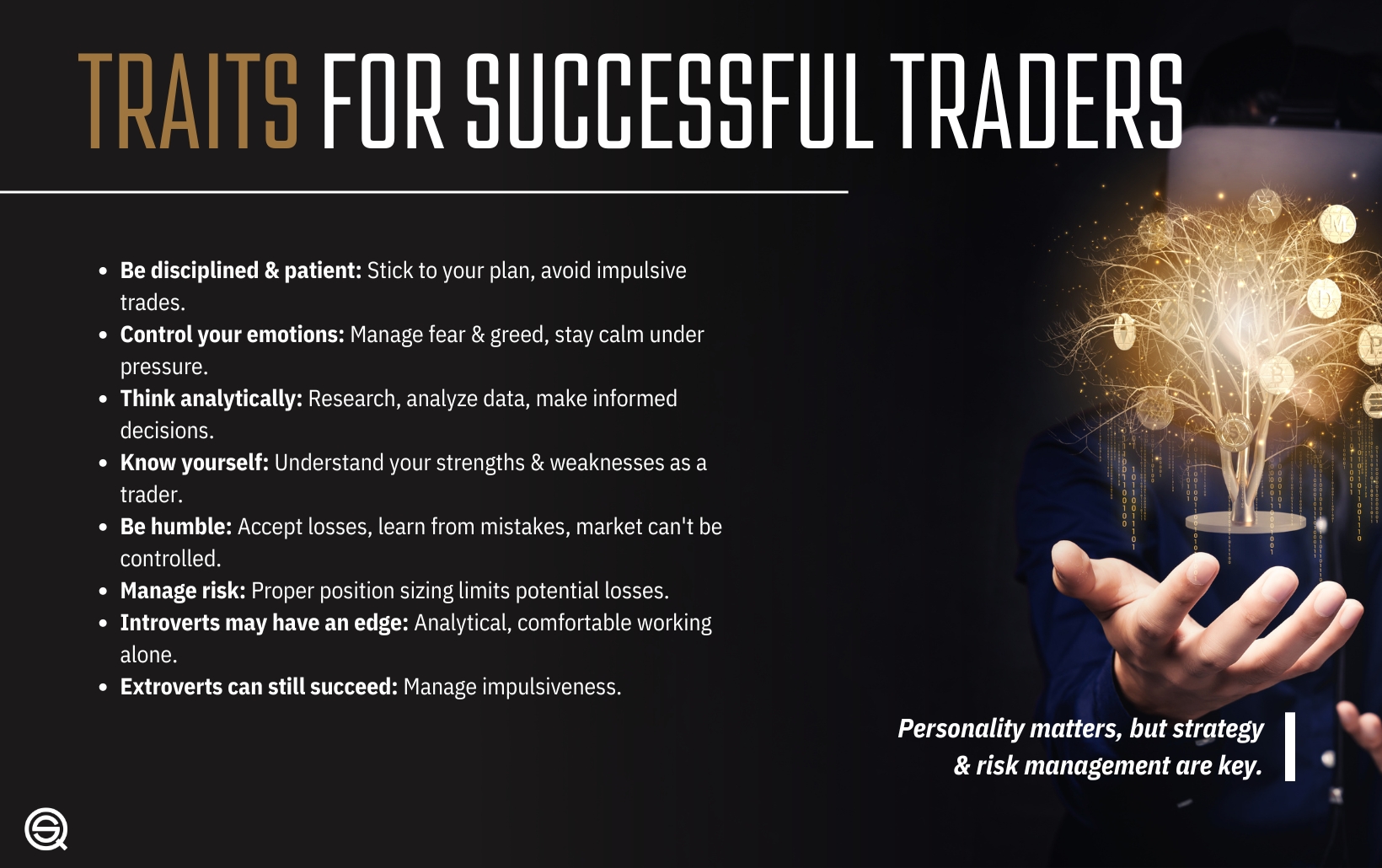Did you know that some traders can predict market movements as accurately as a cat predicting the best spot to nap? In the world of day trading, personality types play a crucial role in success. This article explores which personality traits excel in day trading and how risk tolerance impacts trading outcomes. We delve into tailored strategies for analytical thinkers and impulsive traders, while highlighting the importance of discipline and emotional intelligence. You'll discover how introverts and extroverts approach trading differently, the challenges they face, and how traits like patience and self-awareness can enhance performance. Additionally, we address common pitfalls for various personalities and offer tips for procrastinators and anxiety-prone traders. Read on to learn how DayTradingBusiness can help you align your personality with effective trading strategies for optimal results.
What personality types excel in day trading?
Personality types that excel in day trading include:
1. Analytical Thinkers: They thrive on data analysis, making informed decisions based on charts and market trends.
2. Risk-Takers: Individuals who are comfortable with uncertainty and can handle financial risks tend to perform well.
3. Disciplined Individuals: Those who stick to a strategy and manage their emotions effectively can avoid impulsive trades.
4. Adaptable Personalities: Traders who can quickly adjust their strategies in response to market changes often succeed.
5. Detail-Oriented People: A keen eye for detail helps in spotting trends and anomalies in the market.
These traits enable successful navigation of the fast-paced day trading environment.
How does risk tolerance influence day trading success?
Risk tolerance significantly influences day trading success by determining how much market volatility a trader can handle. High risk tolerance allows traders to pursue aggressive strategies, potentially leading to higher returns but also greater losses. Conversely, traders with low risk tolerance may miss out on profitable opportunities due to fear of losses, sticking to safer trades that yield smaller gains. Understanding personal risk tolerance helps traders create strategies that align with their emotional comfort, ultimately impacting their decision-making and profitability in day trading.
What are the best trading strategies for analytical thinkers?
Analytical thinkers excel in day trading by using strategies that rely on data and systematic analysis. Here are some of the best trading strategies for them:
1. Quantitative Analysis: Use mathematical models to identify trading opportunities based on historical data and statistical measures.
2. Technical Analysis: Analyze price charts and indicators like moving averages, RSI, and MACD to make informed decisions.
3. Algorithmic Trading: Develop algorithms to automate trading based on specific criteria and market conditions, reducing emotional bias.
4. Scalping: Execute a high volume of trades for small profits, relying on quick analysis and execution.
5. Swing Trading: Identify short-term trends and hold positions for a few days or weeks based on analytical evaluations.
6. Backtesting: Test strategies against historical data to validate their effectiveness before applying them in real trading.
7. Risk Management: Use analytical tools to assess risk and set stop-loss orders effectively.
These strategies leverage an analytical approach, maximizing data-driven decision-making and minimizing emotional influences.
How can impulsive traders succeed in day trading?
Impulsive traders can succeed in day trading by implementing strict risk management, setting clear entry and exit points, and using a disciplined approach to trading strategies. They should develop a trading plan that includes predefined rules to minimize emotional decision-making. Keeping a trading journal helps track mistakes and successes, allowing for adjustments over time. Additionally, utilizing tools like stop-loss orders can protect against significant losses. Focusing on a few stocks or instruments can reduce overwhelm and enhance decision-making. Lastly, continuous education about market trends and strategies can help impulsive traders make more informed choices.
What traits make a disciplined trader effective?

Effective disciplined traders share several key traits:
1. Emotional Control: They manage emotions like fear and greed, sticking to their trading plan regardless of market fluctuations.
2. Consistency: They follow a routine and make decisions based on analysis rather than impulse.
3. Patience: They wait for the right opportunities instead of forcing trades, understanding that timing is crucial.
4. Adaptability: They adjust strategies based on market conditions without deviating from their core principles.
5. Focus: They maintain concentration on their trading goals and avoid distractions that can lead to mistakes.
6. Risk Management: They set strict limits on losses and never risk more than they can afford to lose.
These traits collectively foster a disciplined approach that enhances trading effectiveness.
How do introverts approach day trading differently?
Introverts in day trading typically focus on analysis over social interaction. They prefer solitary research, using data and charts to make informed decisions rather than relying on group discussions or forums. Introverts may take a more cautious approach, emphasizing risk management and strategic planning. They often excel in detailed record-keeping and self-reflection, allowing them to learn from their trades without the external pressures of competition. This methodical style helps them stay calm during market fluctuations, giving them an edge in making rational choices.
What are the challenges for extroverted day traders?
Extroverted day traders often face challenges like impulsive decision-making, as their need for social interaction can lead to overtrading or chasing trends. They may struggle with patience, finding it hard to wait for optimal setups. Additionally, extroverts might become overly influenced by the opinions of others in trading communities, leading to inconsistent strategies. Managing emotions is crucial; excitement can cloud judgment during volatile markets. Lastly, they might find it challenging to focus in a solitary trading environment, which is often necessary for success.
How does emotional intelligence affect trading decisions?
Emotional intelligence (EI) significantly impacts trading decisions by influencing how traders manage stress, handle losses, and respond to market fluctuations. High EI helps traders maintain composure during volatile conditions, enabling rational decision-making rather than impulsive reactions. Traders with strong emotional awareness can better recognize their own biases and emotional triggers, which leads to more disciplined trading strategies. For instance, a trader who understands their fear of loss may set stricter stop-loss orders to mitigate emotional responses. Ultimately, EI fosters resilience and adaptability, crucial traits for successful day trading across different personality types.
How Does Day Trading Suit Different Personality Types?

Day trading is the practice of buying and selling financial instruments within the same trading day, aiming to profit from short-term price movements. Different personality types approach day trading in unique ways; for example, risk-takers may prefer aggressive strategies, while more cautious traders might focus on safer, low-volatility stocks. Each personality type should tailor their trading strategy to align with their risk tolerance and decision-making style.
Learn more about: What is Day Trading?
What personality traits lead to poor day trading outcomes?
Impulsiveness leads to poor day trading outcomes, as traders make hasty decisions without proper analysis. A lack of discipline causes inconsistency in following trading plans, while emotional trading results in fear or greed overriding strategy. Overconfidence can lead to excessive risk-taking, and impatience often results in premature exits or entries. Lastly, low resilience to stress can hinder a trader's ability to recover from losses, clouding judgment in future trades.
How can a procrastinator improve their trading skills?
To improve trading skills, a procrastinator should start by setting specific, achievable goals. Break tasks into small, manageable steps to avoid overwhelming feelings. Create a structured daily routine that includes dedicated trading practice and study time. Utilize tools like timers to maintain focus and limit distractions.
Engage with a trading community for accountability and support. Regularly review trades to learn from mistakes and successes. Use simulation platforms to practice without real stakes. Lastly, stay disciplined by adhering to a trading plan to minimize impulsive decisions.
What strategies work for risk-averse day traders?
Risk-averse day traders should focus on strategies that minimize exposure while maximizing potential gains. Here are effective approaches:
1. Set Strict Stop-Loss Orders: Always define clear stop-loss levels to limit potential losses on trades.
2. Trade High-Quality Stocks: Choose established stocks with stable price movements instead of volatile ones.
3. Use Smaller Position Sizes: Limit the amount invested in each trade to reduce overall risk.
4. Focus on Technical Analysis: Use charts and indicators to make informed decisions, rather than relying on news or speculation.
5. Implement a Daily Trading Plan: specific goals and stick to them to avoid impulsive trades.
6. Avoid Overtrading: Limit the number of trades per day to reduce transaction costs and emotional stress.
7. Practice Risk Management: Only risk a small percentage of your trading capital on any single trade.
8. Utilize Paper Trading: Practice strategies in a simulated environment to build confidence without financial risk.
By adopting these strategies, risk-averse day traders can navigate the market more safely and effectively.
How do different personality types handle market volatility?
Different personality types handle market volatility in distinct ways:
1. Analytical Types: They rely on data and analysis, using charts and indicators to make informed decisions. They may stay calm during volatility, waiting for the right signals.
2. Amiable Types: These traders often seek reassurance from others. They may struggle with volatility, preferring stable conditions and might delay decisions until they feel more secure.
3. Driver Types: They thrive on action and quick decisions. During volatility, they may capitalize on opportunities but risk making impulsive trades without thorough analysis.
4. Expressive Types: They are influenced by emotions and market sentiment. Volatility can excite them, leading to bold trades, but they may also face challenges if emotions cloud their judgment.
Understanding these traits helps traders navigate market swings effectively.
What role does patience play in successful day trading?
Patience is crucial in successful day trading because it allows traders to wait for the right opportunities rather than impulsively entering or exiting trades. It helps in managing emotions, reducing the risk of panic selling or buying. With patience, traders can stick to their strategies, analyze market trends, and make informed decisions, leading to better long-term outcomes. This quality is especially important for personalities prone to overreacting or seeking instant gratification.
How can self-aware traders capitalize on their strengths?

Self-aware traders can capitalize on their strengths by tailoring their strategies to fit their personality traits. For example, analytical traders might excel with data-driven approaches, leveraging technical analysis and backtesting. Intuitive traders should trust their gut feelings and embrace quick decision-making. Risk-tolerant traders can focus on high-volatility stocks, while more cautious traders should prioritize risk management and steady gains. Regularly reflecting on past trades helps refine strategies and build confidence in their unique style. This self-awareness allows traders to play to their strengths, enhancing their overall performance in day trading.
What common mistakes do different personalities make in trading?
Common mistakes in day trading vary by personality type.
1. Impulsive Traders: They often enter trades without proper analysis, leading to losses. Patience is key; waiting for the right setup can prevent costly mistakes.
2. Overanalyzers: They get stuck in analysis paralysis, missing opportunities while they’re busy researching. Setting clear criteria for trades can help them act decisively.
3. Risk-Takers: They may over-leverage or ignore stop-losses, risking significant capital. Establishing strict risk management rules is essential.
4. Avoiders: They hesitate to make trades out of fear, missing profitable moves. Building confidence through practice and small trades can help.
5. Perfectionists: They get bogged down by the desire for flawless trades, leading to missed opportunities. Accepting that losses are part of trading can improve their mindset.
Each personality type has unique pitfalls, but awareness and strategy adjustments can enhance trading success.
How can traders with high anxiety manage their emotions?
Traders with high anxiety can manage their emotions by implementing a few key strategies. First, establish a structured trading plan that includes clear entry and exit points. This reduces uncertainty and helps maintain focus. Second, practice mindfulness techniques, like deep breathing or meditation, to stay grounded during trades. Third, set realistic goals to minimize pressure and avoid overtrading. Fourth, take regular breaks to clear your mind and reduce stress. Finally, consider journaling your trades to reflect on decisions and emotions, which can provide insights and improve emotional regulation over time.
Conclusion about Day Trading for Different Personality Types
In summary, understanding how different personality types impact day trading success is crucial for developing effective strategies. Traders must recognize their own traits, from risk tolerance to emotional intelligence, to tailor their approach and improve performance. By leveraging strengths and addressing weaknesses, individuals can navigate market volatility more effectively. DayTradingBusiness is here to provide insights and strategies that align with your unique personality, helping you thrive in the fast-paced world of day trading.